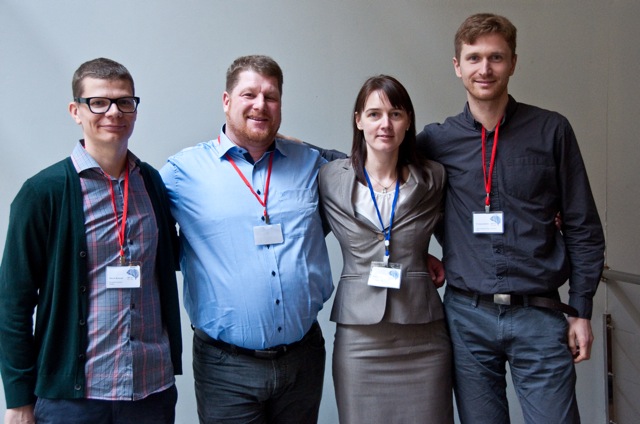SequenceAD: Benefits and detrimental effects of sequence variants of Amyloid-β: towards the use of small peptides for aggregate dissolution therapy in dementia
EEA Norway grants funding for East European countries (via VIAA)
2015-2017
![]()
![]()
Partners:
Jens Pahnke, University of Oslo (UiO), Norway
Henriks Bīverstols & Kristap Jaudzems, Organic Sythesis Institute (OSI), Riga, Latvia
Baiba Jansone & Vija Kluša, University of Latvia (LU), Riga, Latvia
Abstract:
The overall goal of this project is to develop the new strategy for the treatment of the Alzheimer disease (AD) and to enhance research-based knowledge in Latvia through a long term collaboration of OSI, LU and UiO. The Lativian research groups at OSI will provide their expertise in structural analyses to start an iterative set of experiments. The UiO will provide knowledge and expertise in the field of disease models and analyses. The LU partners will have access to world-wide unique mouse models, and are skilled in the performance of behavioural and cognitive tests.
Neurodegenerative diseases represent an increasing threat to the society and families in both countries. Deposition of toxic proteins in the brain leads to dementia, motor dysfunction, and psychiatric problems. Despite enormous efforts, so far, the pathomechanism of the most abundant form of these diseases, sporadic AD, has not been revealed and treatment is not available. Aggregation of intracerebrally generated Aβ peptides is the main reason for pathological deposits. It has been discovered by the Pahnke lab that removal of toxic peptide monomers is indeed an innovative option for treatment and prevention of dementia. Furthermore, it was first found in an Italian family that specific mutations in the N-terminal part of Aβ lead to the protection of heterocygote carriers by reducing the aggregation propensity.
Based on this information, we will set up a joint program to investigate whether amino acid changes could be exploited as an innovative method to dissolve higher order Aβ aggregates and to enhance clearance of Aβ from the brain into the blood stream. We will use the extensive expertise of the team at the OSI to decipher structural differences of specific mutations and co-aggregated peptides. The resulting data will be used to iterate in vivo experiments. We will take opportunity of exchange of Latvian students to Norway for in vivo investigations and methods transfer.
Keywords: Alzheimer’s, amyloid-beta, sequence variants
Resources / Links:
K. Jaudzems – read more….
H. Bīverstols – read more….
Meeting in Riga in 2015:

Henriks Bīverstols, Jens Pahnke, Baiba Jansone, Kristaps Jaudzems
